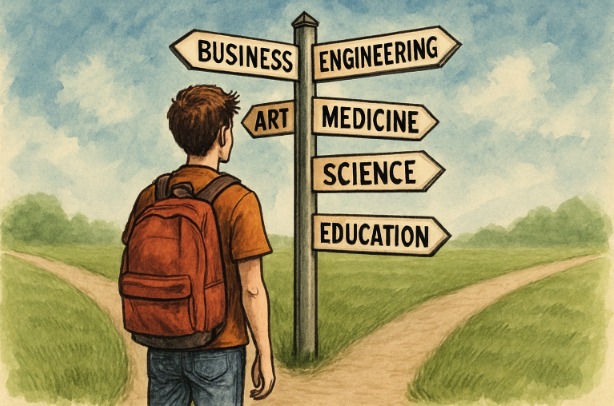Last Updated on August 20, 2025 by Luxe
Key Takeaways
- Selecting a major is a multifaceted decision that shapes academic paths and future careers.
- Personal interests, job outlooks, and skills should guide your choice, not just external pressures.
- Research, conversations with advisors, and real-life experiences provide valuable insights.
- Many students change their majors at least once, which is a normal part of academic exploration.
- Non-linear career paths are increasingly common in the modern workforce.
Why Your Major Matters
Choosing your major is often the first actionable step toward shaping your identity in higher education and your future professional life. Not only does your chosen field influence the academic experiences you’ll have, but it can also affect job prospects and career satisfaction long after graduation. While STEM fields are known for higher average starting salaries, majors such as humanities and social sciences nurture essential skills for leadership, adaptability, and communication. Exploring fields like liberal arts majors can broaden your perspective, offering both intellectual growth and flexibility for various career paths.
The impact of your major can last well beyond your undergraduate years. For instance, alum surveys published by notable higher education sources consistently point to the value of foundational, transferable skills—critical thinking, problem-solving, and written communication. These are competencies fostered across a wide variety of disciplines, including liberal arts, which regularly produce graduates ready to pivot as economic conditions and industries evolve.
Self-Reflection: Essential Steps Before Choosing
Introspection is a fundamental and empowering process that plays a crucial role in helping you make a confident, well-informed decision about which college major to pursue. To begin this journey of self-discovery, it’s important to carefully analyze and reflect on what truly interests you at a deep level—consider what issues, topics, or activities consistently keep you engaged and curious. Think about the hobbies, extracurricular activities, or school projects that you tend to lose track of time while doing, as these can be strong indicators of your passions and strengths. Additionally, pay attention to which classes or subjects feel the most rewarding and fulfilling, both intellectually and emotionally, as these can guide you toward a satisfying academic and career path. To gain further insights, consider utilizing various career assessment tools, personality inventories, and other self-assessment resources that can provide valuable perspectives on your strengths and preferences. Equally important are honest conversations with friends, family members, mentors, or advisors who observe your daily behaviors and strengths, as their feedback can offer an external perspective that might highlight aspects of yourself you hadn’t previously considered. According to reporting from CNBC, college applicants who prioritize self-reflection and self-awareness during their decision-making process are significantly more likely to choose majors where they can thrive both intellectually and emotionally, leading to greater satisfaction and success in their higher education journey.
Considering Job Outlook and Industry Demand
Every student should carefully weigh and consider both the current and future job market trends when choosing or contemplating a major. Occupational outlook and job stability can differ significantly across various industries and sectors. According to recent data from the U.S. Bureau of Labor Statistics, sectors such as healthcare, technology, and renewable energy are projected to experience rapid growth and expansion in the coming years. Students must analyze not only national employment trends but also regional and local data to accurately pinpoint fields and industries that are likely to offer the best employment opportunities, job security, and career advancement prospects after graduation.
Balancing Passion with Practicality
Striking the right balance between personal interests and practical concerns is a nuanced and often complex part of selecting a major. While passion drives long-term satisfaction and personal fulfillment, it’s equally important to evaluate the career potential, job stability, and earning power associated with your chosen field. Many students find a productive middle path by double-majoring or minoring in different subjects — for example, combining a love of theater with business studies. With this approach, you can cultivate your creativity and develop a well-rounded skill set, while also building a foundation that can open doors in a variety of sectors, industries, and career paths, ultimately giving you more opportunities for success and personal satisfaction.
Speaking With Academic Advisors and Mentors
Academic advisors and mentors are invaluable sources of guidance and support as you navigate the often complex and pivotal process of choosing or changing your major. These experienced professionals can help you not only identify your strengths, talents, and interests but also investigate interdisciplinary opportunities that align with your career aspirations. They assist in creating comprehensive academic plans tailored specifically to your unique interests, academic strengths, and graduation goals, ensuring a smooth and successful college journey. A recent U.S. News & World Report article notes that students who regularly consult with their advisors and mentors tend to be more likely to graduate on time, achieve better academic performance, and report higher satisfaction with their overall college experience, making it crucial to establish a strong advising relationship early on.
Exploring Double Majors and Minors
Modern universities increasingly support and encourage academic customization, offering students more flexible options to tailor their educational paths based on their interests and career goals. This makes it more feasible than ever to pursue double majors or to add minors to your degree program, thereby enriching your academic experience. Such an approach broadens your educational scope significantly, allowing you to develop expertise in more than one discipline and enhancing your overall knowledge base. For example, combining studies in computer science and psychology can open up diverse career paths, including roles in artificial intelligence development, human-computer interaction design, or market research analysis. However, pursuing this route demands careful and strategic academic planning. It’s essential to work closely with an academic advisor to avoid scheduling conflicts, meet graduation requirements, and maintain a manageable workload to balance your coursework and extracurricular activities successfully.
Adapting to Change and Embracing Flexibility
Changing your major at least once during your academic journey is quite common among students. Recent studies from Inside Higher Ed show that up to 30% of students switch their majors at least once during their time in college. The professional landscape is shifting rapidly, and having the ability to adapt to these changes is now more valuable than ever for long-term success. Whether you discover a new passion through an elective course, find yourself more interested in a different field, or identify emerging career paths that you hadn’t previously considered, remaining open to change is essential. Being flexible and willing to pivot can greatly enhance your academic experience, broaden your skill set, and ensure you are well-prepared for the evolving job market, ultimately contributing to your overall academic and career resilience.
Real-Life Experiences and Internships
Practical experiences are absolutely essential for validating and refining your academic direction while also preparing you effectively for success after graduation. Engaging in internships, part-time jobs, volunteer opportunities, and undergraduate research projects all offer valuable hands-on insights and real-world skills that traditional classroom learning sometimes cannot fully provide. These experiences can greatly inform your decision on whether a particular field or work environment aligns well with your skills, passions, and personal values, and they also supply practical, real-world experience that employers highly value in today’s job market. According to a survey cited by The New York Times, students who have completed internships and other practical experiences tend to have a significant advantage in securing post-college employment and better job placement prospects.
Conclusion
Selecting a college major is an evolving process that involves careful consideration and self-discovery, and a variety of factors, including introspection, mentorship, practical concerns, and lived experience, shape it. By actively engaging in deep reflection on personal strengths, talents, passions, and interests, students can better understand themselves and what they want to pursue. Additionally, researching industry prospects, labor market trends, and future opportunities can provide valuable insights into potential career paths. Seeking advice from mentors, professors, career counselors, and industry professionals can offer guidance, support, and different perspectives. Gaining firsthand experience through internships, volunteer work, and part-time jobs allows students to test their interests and develop relevant skills. Throughout this process, it’s essential to remain open to change, adaptable, and willing to revisit and revise one’s choices, embracing the flexibility that comes with this evolving journey. It not only facilitates personal growth but also enhances professional success in our rapidly changing and competitive world. This ongoing exploration ultimately helps students make more informed and confident decisions about their academic and career futures.




